Okhlopkov Fedor Matveyevich - sniper of the Great Patriotic War
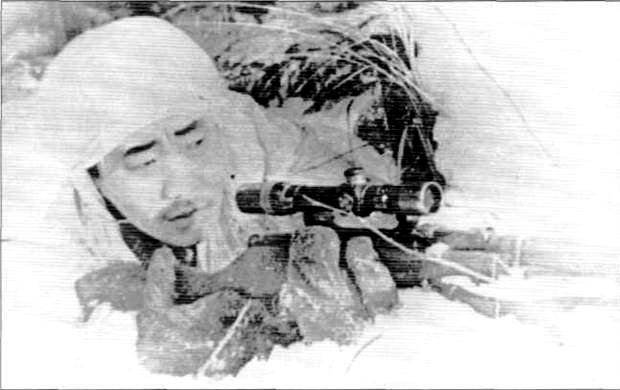
3 was born in March 1908, in the village of Krest-Khaldzhai, now Tomponsky district (Yakutia), in a peasant family. Primary education. He worked on the farm. Since September 1941, the Red Army. From December of the same year at the front. Member of the fighting near Moscow, the liberation of Kalinin, Smolensk, Vitebsk regions.
By June 1944, the sniper of the 234 th rifle regiment (179 th rifle division, 43 th army, 1 th Baltic front) Sergeant FM Okhlopkov destroyed enemy soldiers and officers from a 429 sniper rifle.
6 May 1965 of the year for the courage and military prowess shown in the battles with enemies, was awarded the title Hero of the Soviet Union.
After the war, he was demobilized. Returned home, was an employee. In 1954 - 1968 worked at the state farm "Tomponsky". Deputy of the Supreme Soviet of the USSR 2-th convocation. Died 28 May 1968 of the year.
He was awarded the orders: Lenin, Red Banner, World War 2 degree, Red Star (twice); medals. The name of the Hero was given to the Tomponsky state farm, the streets in the city of Yakutsk, the village of Khandyga and the village of Cherkekh (Yakutia), as well as a vessel of the Ministry of Marine Fleet.
The combat activity of F. M. Okhlopkov is dedicated to the book by D. V. Kusturov "Sergeant without a miss" (it can be read on the website - "http://militera.lib.ru" - "Military literature").
MAGIC SHOOTER
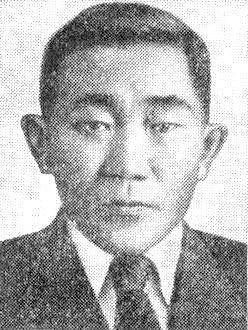 Passing by the club in the village of Krest-Khaldzhai, frail, of short stature, an elderly worker of the Tomponsky state farm heard a piece of radio broadcasts of the latest news. It was heard to his ears: "... for the exemplary performance of the combat missions of the command on the battle fronts and the bravery and heroism shown at the same time to assign the title of Hero of the Soviet Union with the award of the Order of Lenin and the Gold Star medal to stock sergeant Okhlopkov Fedor Matveyevich ..."
Passing by the club in the village of Krest-Khaldzhai, frail, of short stature, an elderly worker of the Tomponsky state farm heard a piece of radio broadcasts of the latest news. It was heard to his ears: "... for the exemplary performance of the combat missions of the command on the battle fronts and the bravery and heroism shown at the same time to assign the title of Hero of the Soviet Union with the award of the Order of Lenin and the Gold Star medal to stock sergeant Okhlopkov Fedor Matveyevich ..."The worker slowed down, stopped. His name is Okhlopkov, the name is Fedor, and the patronymic is Matveyevich, in the military ID in the column “Title” it is written: stock sergeant.
It was 7 May 1965 of the year - 20 years since the end of the war, and although the worker knew that he had long been represented to a high rank without stopping, he passed by the club, through the village he had dear to his heart, in which almost all his half-century life had gone through.
He fought and got his: two orders of the Red Star, the Order of the Patriotic War and the Red Banner, several medals. Until now, 12 wounds him, and people who understand a lot about such matters equate every wound to an order.
- Okhlopkov Fedor Matveevich ... And there is such a coincidence: the surname, first name, patronymic name, and title - everything came together, - the worker smiled, going out to the tall Aldan.
He sank to the shore, covered with young spring grass, and, looking at the fells covered with green moss of taiga, slowly went into the distant past ... He saw himself from the outside, through the eyes of another person. Here he is, 7-year-old Fedya, cries over his mother's grave, buries his father in 12 for years and, having graduated from the 3 class, leaves school forever ... with his skill, mowing hay, carpentry, in the lake ice-holes he catches perch, in the taiga sets crossbows on hares and traps on foxes.
An alarming, windy day of the beginning of the war is coming, when everything familiar and dear should be said goodbye, and maybe forever.
Okhlopkova was drafted into the army at the beginning of winter. In the village of Krest - Khaldzhay, the soldiers were escorted with speeches and music. It was cold. Over 50 degrees of frost. Salty tears of his wife froze on her cheeks and rolled like fractions ...
From the Cross - Haldzhai to the capital of the autonomous republic is not so far. A week later, journeys through the taiga on dogs that were drafted into the army were in Yakutsk.
Okhlopkov did not stay in the city, and together with his brother Vasily and his fellow villagers went by truck through Aldan to the Bolshoi Nevers railway station. Together with his countrymen - hunters, plowmen and fishermen - Fedor got into the Siberian division.
It was hard for the Yakuts, Evenks, Odulami and Chukchi to leave their republic, which is 10 times the size of Germany by area. It was a pity to part with their wealth: with collective farm herds of deer, with 140 millions of hectares of Dahurian larch sprinkled with glitter of forest lakes, with billions of tons of coking coal. Everything was expensive: the blue artery of the Lena River, and the gold veins, and mountains with loaches and stony placers. But what to do ? We must hurry. German hordes attacked Moscow, Hitler brought a knife over the heart of the Soviet people.
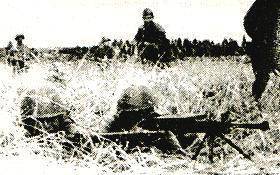 They agreed with Vasily, who was also in the same division, to stick together and asked the commander to give them a machine gun. The commander promised two weeks, while getting to Moscow, patiently explained to the brothers the device of the sights and its details. The commander with his eyes closed in front of the enchanted soldiers deftly dismantled and assembled the car. Both Yakuts learned how to handle a machine gun along the way. Of course, they understood that there was still much to be mastered before they became real machine gunners: they had to practice firing at their advancing soldiers, firing at targets - suddenly appearing, quickly hiding and moving, learn to hit on planes and tanks. The commander assured that all this will come with time, in the experience of battles. Fighting for a soldier is the most important school.
They agreed with Vasily, who was also in the same division, to stick together and asked the commander to give them a machine gun. The commander promised two weeks, while getting to Moscow, patiently explained to the brothers the device of the sights and its details. The commander with his eyes closed in front of the enchanted soldiers deftly dismantled and assembled the car. Both Yakuts learned how to handle a machine gun along the way. Of course, they understood that there was still much to be mastered before they became real machine gunners: they had to practice firing at their advancing soldiers, firing at targets - suddenly appearing, quickly hiding and moving, learn to hit on planes and tanks. The commander assured that all this will come with time, in the experience of battles. Fighting for a soldier is the most important school.The commander was Russian, but before graduating from a military school, he lived in Yakutia, worked on gold and diamond mines and knew well that the sharp eye of the Yakut sees far, does not lose animal traces either in the grass, on the moss, or on the stones and Accuracy hits a little shooters in the world, equal to the Yakuts.
We arrived in Moscow on a frosty morning. A column, with rifles behind them, passed through Red Square, past Lenin's Mausoleum and went to the front.
The 375 Rifle Division, formed in the Urals and poured into the 29 Army, advanced to the front. In the 1243 regiment of this division were Fedor and Vasily Okhlopkovs. The commander with two dice on his coat buttonholes kept his word: he gave them a light machine gun for two. Fedor became the first number, Vasily - the second.
Being in the forests of the Moscow region, Fedor Okhlopkov saw fresh divisions approaching the front edge, tanks and artillery were concentrated. It was like - after a heavy defensive battles preparing crushing blow. Lived forests and groves.
The wind gently bandaged the bloody, wounded ground with clean stripes of snow, and diligently covered up the exposed ulcers of the war. Snowstorms raged, covering the trenches and trenches of the frozen fascist warriors with a white shroud. Day and night the shrill wind sang to them the mournful funeral song ...
At the beginning of December, the division commander, General N. A. Sokolov, visited the battalions of the regiment, and a day later, after an artillery bombardment, the division rushed to the offensive in the morning.
In the first chain of his battalion, the Yakut brothers ran, often burrowing into the prickly snow, giving short oblique queues over green enemy overcoats. They managed to defeat several fascists, but at that time they had not yet counted revenge. Strength was tried, the accuracy of hunting eyes was checked. For two days without a break, with varying success, there was a hot battle with the participation of tanks and airplanes, and for two days no one slept for a minute. The division managed to cross the Volga on broken ice by projectiles, 20 versus drive enemies.
In pursuit of a retreating enemy, our fighters liberated Semenovskoye and Dmitrovskoye villages that were burned to the ground, occupied the northern outskirts of Kalinin, covered by a fire. “Yakut” frost was in the cold; There is a lot of firewood around, but there was no time to make a fire, and the brothers warmed their hands on the warmed barrel of the machine gun. After a long retreat, the Red Army was advancing. The most pleasant sight for the soldier is the fleeing enemy. In two days of fighting, the regiment in which the Okhlopkov brothers served, destroyed over 1000 fascists, defeated the headquarters of two German infantry regiments, captured rich war trophies: cars, tanks, guns, machine guns, hundreds of thousands of cartridges. Both Fedor and Vasily, just in case, were shoved into the pockets of their overcoats according to the trophy “Parabellum”.
Victory came at a high price. Many soldiers and officers lost the division. The commander of the regiment, Captain Chernozersky, was killed by the death of the brave; Bursting bullet German sniper on the spot struck Vasily Okhlopkova. He fell to his knees, stuck his face in the prickly, like nettle, snow. He died in the arms of his brother, easily, without torment.
Fedor began to cry. Standing without a hat over the cooling body of Vasily, he swore an oath to avenge his brother, the dead man promised to open his account of the destroyed fascists.
At night, sitting in a hastily dug-out dugout, the division's commissar, Colonel S. Kh. Aynutdinov, wrote about this oath in political communication. This was the first mention of Fedor Okhlopkov in the documents of the war ...
Reporting the death of his brother, Fedor wrote about his oath and in the Cross - Haldzhai. His letter was read in all three villages belonging to the village council. Villagers approved the courageous determination of his countryman. The oath and his wife, Anna Nikolaevna, and the son Fedya were approved.
Fedor Matveyevich recalled all this on the bank of the Aldan, watching the spring wind, like flocks of sheep, drive white ice floes to the west. From the thoughts of his ripped off the hum of the car, drove the secretary of the district party committee.
- Well, dear, congratulations. - Jumped out of the car, hugged, kissed.
The decree read by radio concerned him. His government equated the name Yakuts with 13 - Heroes of the Soviet Union: S. Asyamova, M. Zhadeykina, V. Kolbunova, M. Kosmachyova, K. Krasnoyarova, A. Lebedev, M. Lorin, V. Pavlova, F. Popov, V Streltsova, N. Chusovskogo, E. Shavkunova, I. Shamanova. He is the 14 of the Yakut, marked with the Golden Star.
A month later, in the meeting room of the Council of Ministers, in which a poster hung: "To the people - to the bogatyr - aikhal!" Okhlopkova was awarded the Homeland award.
Thanking the audience, he briefly talked about how the Yakuts fought ... Memories flooded Fyodor Matveyevich, and he seemed to be part of himself at war, but not in the 29 army, but in the 30, which subordinated him division. Okhlopkov heard the speech of the army commander, General Lelyushenko. The commander asked the commanders to find apt shooters, to prepare snipers from them. So Fedor became a sniper. The work was slow, but not boring at all: the danger made it exciting, it required rare courage, excellent orientation to the terrain, sharp eyes, composure, iron restraint.
2 March, 3 April and 7 May Okhlopkov was injured, but each time he remained in the ranks. A taiga resident, he understood the rural pharmacopoeia, knew the healing properties of herbs, berries, leaves, knew how to heal diseases, had secrets handed down from generation to generation. Clinging his teeth from pain, he burned wounds with a fire of resinous pine torch and did not go to the medical battalion.
* * *
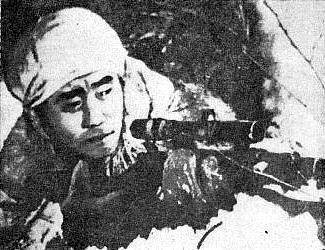 In early August, 1942, the troops of the Western and Kalininsky fronts broke through the enemy defenses and began to attack the Rzhevsky and Gzhatsko-Vyazemsky directions. 375-division, going to the tip of the offensive, took the brunt of the enemy. In the battles of Rzhev, the advancement of our troops was delayed by the Nazi armored train "Hermann Goering", plying on a high railway embankment. The division commander decided to block the armored train. A group of brave souls was created. Okhlopkov asked to turn it on. After waiting for the night, putting on camouflage robes, the soldiers crawled to the goal. The enemy lit up all the approaches to the railway with rockets. Red Army soldiers had to lie on the ground for a long time. Below against the gray sky, like a mountain range, there was a black silhouette of an armored train. Smoke billowed over the locomotive, the bitterish smell of its wind carried it to the ground. The soldiers crawled closer and closer. Here is the long-awaited embankment.
In early August, 1942, the troops of the Western and Kalininsky fronts broke through the enemy defenses and began to attack the Rzhevsky and Gzhatsko-Vyazemsky directions. 375-division, going to the tip of the offensive, took the brunt of the enemy. In the battles of Rzhev, the advancement of our troops was delayed by the Nazi armored train "Hermann Goering", plying on a high railway embankment. The division commander decided to block the armored train. A group of brave souls was created. Okhlopkov asked to turn it on. After waiting for the night, putting on camouflage robes, the soldiers crawled to the goal. The enemy lit up all the approaches to the railway with rockets. Red Army soldiers had to lie on the ground for a long time. Below against the gray sky, like a mountain range, there was a black silhouette of an armored train. Smoke billowed over the locomotive, the bitterish smell of its wind carried it to the ground. The soldiers crawled closer and closer. Here is the long-awaited embankment.Lieutenant Sitnikov, who commanded the group, gave a conditional signal. The fighters, jumping to their feet, threw steel boxes with grenades and bottles of fuel; sighing heavily, the armored train moved toward Rzhev, but there was an explosion in front of him. The train tried to leave for Vyazma, but even there the brave sappers blew up the canvas.
The team of the armored train lowered new rails from the base car, trying to restore the destroyed path, but under well-aimed automatic bursts, having lost several people killed, was forced to return under the protection of the iron walls. Okhlopkov hit half a dozen fascists then.
For several hours a group of brave souls was holding an armored train resisting, maneuvering without resistance. At noon, our bombers arrived, knocked down a steam locomotive, threw down the armored car. A group of daredevils saddled the railroad and held until the battalion approached her.
The fighting near Rzhev took a fierce character. Artillery destroyed all the bridges, plowed roads. The week was stormy. Rain poured down, making it difficult for tanks and guns to advance. The entire burden of military suffering fell on the infantry.
The number of human victims measured the temperature of the battle. In the archives of the Soviet Army, a laconic document is preserved:
"From 10 to 17 in August, the 375 Division lost 6140 people killed and wounded. The 1243 regiment distinguished itself in the offensive rush. Its commander Lt. Col. Warriors died a heroic death in front of his troops. platoons, petty officers - companies. "
... Branch Okhlopkova advancing in the forward chain. In his opinion, this was the most suitable place for a sniper. In flashes of flame, he quickly found the enemy machine guns and forced them to silence, unmistakably falling into the narrow embrasures and crevices.
In the evening of August 18, during the attack on the small, half-burnt village, Fedor Okhlopkov was seriously injured in the 4 time. Bleeding profusely, the sniper fell and lost consciousness. There was an iron blizzard around the chalk, but two Russian soldiers, risking their own lives, pulled the wounded Yakut out from under the fire on the edge of the grove, under the cover of bushes and trees. The orderlies brought him to the medical battalion, and from there Okhlopkov was taken to the city of Ivanovo, to the hospital.
By order of the troops of the Kalininsky Front, No. 0308 of 27 of August 1942, signed by the commander of the front, Colonel-General Konev, the commander of the branch of machine gunners, Fedor Matveevich Okhlopkov, was awarded the Order of the Red Star. In the award list to this order it is said: "Okhlopkov, with his bravery, more than once in difficult moments of battle, stopped the alarmists, inspired the fighters, led them back into battle."
* * *
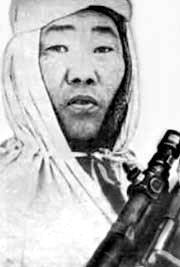 Recovering from the injury Okhlopkov was sent to the 234-th regiment of the 178-th division.
Recovering from the injury Okhlopkov was sent to the 234-th regiment of the 178-th division.In the new division they knew that Okhlopkov was a sniper. The battalion commander was delighted with his appearance. The enemy has a well-aimed shooter. During the day of the 7-th shots, he "shot" the 7 of our soldiers. Okhlopkov was ordered to destroy the invulnerable enemy sniper. At dawn, the magical shooter went hunting. German snipers chose positions at height, Okhlopkov preferred land.
The winding line of German trenches turned yellow at the edge of a tall forest. The sun has risen. Lying in his own trench, open and disguised at night, Fyodor Matveyevich looked at the unfamiliar landscape with his naked eye, wondered where his opponent might be, and then, through an optical device, began to study individual, unremarkable parts of the terrain. An adversary sniper could find a shelter on a tree trunk.
But which one? Behind the German trenches, a high ship forest — hundreds of trunks — could each have a deft, experienced enemy that had to be outwitted. The forest landscape is devoid of clear-cut outlines, trees and shrubs merge into a solid green mass and it is difficult to focus attention on anything. Okhlopkov through binoculars examined all the trees from root to crown. The German shooter probably chose a place on a pine tree with a forked trunk. The sniper glared at the suspicious tree, inspecting every branch on it. The mysterious silence was becoming ominous. He was looking for a sniper who was looking for him. Wins the one who first finds his opponent and, ahead of him, pull the trigger.
As it was agreed, in 8 hours of 12 minutes, in a trench in 100 meters from Okhlopkov, the soldier's helmet was raised on a bayonet. There was a shot from the forest. But the flash failed to detect. Okhlopkov continued to monitor the suspicious pine. For a moment, I saw a solar glare near the trunk, as if someone had spotted a spot of specular ray on the bark, which immediately disappeared, as if it had not existed.
"What could it be?" - thought the sniper, but, no matter how peered, could not find anything. And suddenly, on the spot where a bright spot flashed, a black triangle appeared like the shadow of a leaf. The keen eye of a taiga hunter distinguished a sock through binoculars, to the polished nickel luster of a polished boot ...
"Cuckoo" lurked on a tree. It is necessary, without giving anything away, to wait patiently and, as soon as the sniper is revealed, to strike him with one bullet ... After an unsuccessful shot, the fascist will either disappear, or, having found him, will enter combat, will return fire. In the rich practice of Okhlopkov, he rarely succeeded in taking the same goal twice. Every time after a miss, I had to look for days, track down, wait ...
Half an hour after the shot of the German sniper, on the spot where the helmet was raised, a glove appeared, one, then the second. From the side it would have been thought that the wounded man was trying to rise, clutching at the trench parapet. The enemy pecked at the bait, aimed. Okhlopkov saw a part of his face that appeared among the branches and the black point of the barrel of a rifle. Simultaneously, two shots rang out. Fascist sniper head down flew to the ground.
For a week in the new division, Fedor Okhlopkov sent 11 fascists to the next world. Witnesses of extraordinary duels informed about this from observation points.
October 27 in the battle for the village of Matveyevo Okhlopkov destroyed 27 fascists.
The air was filled with the smell of battle. The enemy counterattacked tanks. Having squeezed into a shallow, hastily dug open trench, Okhlopkov shot in cold blood on the crevices of the menacing machines and fell. In any case, the two tanks, which went straight at him, turned, and the third stopped meters in 30, and the arrows set fire to it with bottles of combustible mixture. The fighters, who had seen Okhlopkov in battle, were amazed at his good fortune, spoke with love and joke about him:
- Fedya as an insured ... Strong ...
They did not know that invulnerability was given to Yakut by caution and difficulty, he preferred to dig 10 meters of trenches than 1 grave meter.
He went on the hunt and at night: he shot at the lights of cigarettes, voices, ringing weapons, bowlers and helmets.
In November, 1942, the regimental commander, Major Kovalyov, presented the sniper to the award, and the command of the 43 Army awarded him the second Order of the Red Star. Then Fyodor Matveyevich became a communist. Taking a party ticket from the head of the political department, he said:
- Joining the party is my second oath of allegiance to the Motherland.
His name increasingly began to appear on the pages of the military press. In the middle of December, 1942, the army newspaper Defender of the Fatherland, wrote on the front page: "The 99 of enemies was destroyed by a sniper - Yakut Okhlopkov." Front-line newspaper "Forward on the enemy!" set Okhlopkova as an example to all front snipers. In "Memo sniper", issued by the front's political department, summarized his experience, offered his advice ...
* * *
The division in which Okhlopkov served was deployed on the 1 Baltic Front. The situation has changed, the landscape has changed. Going hunting every day, from December 1942 to July 1943, Okhlopkov destroyed 159 fascists, among them there are many snipers. In numerous fights with German snipers Okhlopkov was never injured. 12 injuries and 2 contusions he received in offensive and defensive battles, when everyone fought against all. Each wound undermined the health, carried away the forces, but he knew: the candle shines to people, burning itself.
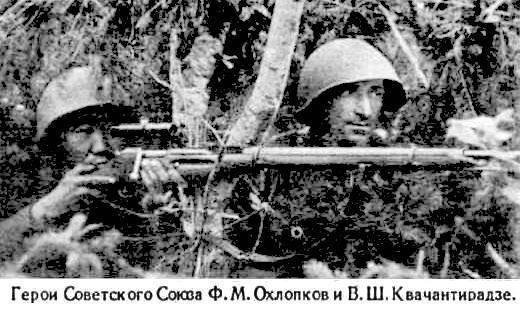
The enemy quickly dismantled the confident handwriting of the magic shooter who put his vindictive signature on the forehead or chest of his soldiers and officers. German pilots dropped leaflets over the regiment's positions, there was a threat to them: "Okhlopkov, surrender. You have no salvation! Take it anyway, dead or alive!"
Lying without movement had hours. Such a state disposed to introspection and reflection. He lay and saw himself in the Cross - Haldjai, on the rocky shore of Aldan, in a family, with his wife and son. He had an amazing ability to go back and wander in it along memory paths, as if in a familiar forest.
Okhlopkov is laconic and does not like to talk about himself. But the fact that he is silent out of modesty, negotiate the documents. The award list for the Order of the Red Banner, which he was awarded for fighting in the Smolensk region, says:
"Being in the combat formations of the infantry at the height of 237.2, at the end of August 1943, a group of snipers led by Okhlopkov steadfastly and courageously beat off the 3 counterattack of numerically superior forces. Sergeant Okhlopkov was contused, but did not leave the battlefield, continued to remain on busy lines and lead a group of snipers. "
In a bloody street battle, Fyodor Matveyevich carried out the soldiers Kolodeznikov and Elizarov, seriously wounded by mines, under the fire of their countrymen. They sent home letters, describing everything as it was, and Yakutia learned about the feat of their faithful son.
The army newspaper "Defender of the Fatherland", closely following the progress of the sniper, wrote:
"F. M. Okhlopkov was in the most brutal battles. He has a keen eye for a hunter, a hard hand of a miner and a big warm heart ... The German, taken by him at sight, is a dead German."
Another curious document has been preserved:
"Fighting characteristic of Sergeant Okhlopkov Fedor Matveyevich Sniper. Member of the CPSU (b). While in the 1 Battalion of the 259 Infantry Regiment from 6 to 23 in January 1944 of the Year, Comrade Okhlopkov exterminated the Hitler invaders 11. does not show sniper fire activity, has stopped day-work and walking. The commander of the 1 battalion is captain I. Baranov. January 23 is 1944 of the year ".
The command of the Soviet Army developed the sniper movement. Fronts, armies, divisions were proud of their well-aimed arrows. Fedor Okhlopkov conducted an interesting correspondence. Snipers of all fronts shared their combat experience.
For example, Okhlopkov advised the young man to Vasily Kurke: "Less imitate ... Look for your own methods of struggle ... Find new positions and new ways of disguise ... Do not be afraid to go behind enemy lines ... You can’t chop with an ax where you need a needle. .. In the pumpkin you have to be round, in the pipe is long ... Until you see the exit, do not enter ... Take out the enemy at any distances. "
Okhlopkov gave such advice to his numerous students. He took them on the hunt. The student saw with his own eyes the subtleties and complexities of the struggle with a cunning enemy.
- In our business, everything is good: a padded tank, a hollow of a tree, a log cabin, a stack of straw, a furnace of a burnt-out hut, a dead horse ...
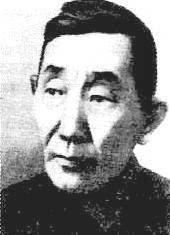 Once, he pretended to be killed and lay all day in a drawn field in a completely open field, amid the silent, touched by the children of corruption, the bodies of the slain soldiers. From this unusual position, he dumped an enemy sniper, who was buried under an embankment in a drainpipe. The enemy soldiers did not even notice where an unexpected shot came from. The sniper lay until the evening and under the cover of darkness crawled to his.
Once, he pretended to be killed and lay all day in a drawn field in a completely open field, amid the silent, touched by the children of corruption, the bodies of the slain soldiers. From this unusual position, he dumped an enemy sniper, who was buried under an embankment in a drainpipe. The enemy soldiers did not even notice where an unexpected shot came from. The sniper lay until the evening and under the cover of darkness crawled to his.Once Okhlopkov was brought a gift from the front commander - a narrow and long box. He impatiently opened the package and froze with delight when he saw a brand new sniper rifle with a telescopic sight.
There was a day. The sun was shining. But Okhlopkov was impatient to upgrade his weapon. Since yesterday evening, he noticed a fascist observation post on the pipe of a brick factory. Crawled to the trenches of military escort. After a smoke break with the fighters, he rested and, merging with the color of the earth, crawled even further. His body went numb, but he lay unmoved for 3 for an hour and, choosing a convenient moment, fired an observer with one shot. Okhlopkov's revenge account for his brother kept increasing. Here are excerpts from the divisional newspaper: on 14 March 1943 of the year - 147 destroyed by the fascists; July 20 - 171; October 2 - 219; on 13 January 1944 of the year - 309; on March 23 - 329; on April 25 - 339; on June 7 - 420.
7 June 1944, the commander of the regiment of the Guard, Major Kovalev, introduced Sergeant Okhlopkov to the rank of Hero of the Soviet Union. The award list then did not receive its completion. Some intermediate instance between the regiment and the Presidium of the Supreme Soviet of the USSR did not approve it. All the soldiers in the regiment knew about this document, and, although there was no decree yet, the appearance of Okhlopkov in the trenches was often met with a song: "The Golden Fire of the Hero on his chest burns ..."
In April, 1944, the publisher of the army newspaper Defender of the Fatherland, published a poster. It depicts a portrait of a sniper, written in large letters: "Okhlopkov." Below is a poem by the famous military poet Sergei Barents dedicated to the Yakut sniper.
In combat Okhlopkov shot another 9 snipers. Due to revenge reached a record number - 429 killed by the Nazis!
In the battles for the city of Vitebsk 23 June 1944, the sniper, supporting the assault team, received a through wound to the chest, was sent to the rear hospital and did not return to the front.
* * *
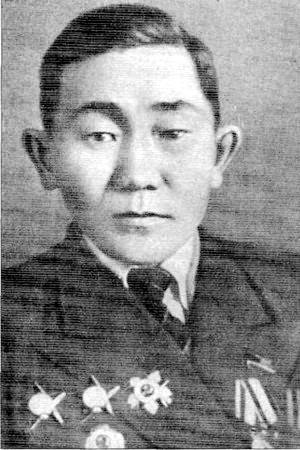 In the hospital Okhlopkov did not lose contact with his comrades, he followed the success of his division, which confidently made its way to the west. The joy of victories and the sorrows of loss reached him. In September, his disciple Burukchiev died after being hit by a bursting bullet, and a month later his friend, the famous sniper Kutenev with 5 gunners, knocked out the 4 tank and, wounded, unable to resist, was crushed by the 5 tank. He learned that front snipers destroyed over 5000 fascists.
In the hospital Okhlopkov did not lose contact with his comrades, he followed the success of his division, which confidently made its way to the west. The joy of victories and the sorrows of loss reached him. In September, his disciple Burukchiev died after being hit by a bursting bullet, and a month later his friend, the famous sniper Kutenev with 5 gunners, knocked out the 4 tank and, wounded, unable to resist, was crushed by the 5 tank. He learned that front snipers destroyed over 5000 fascists.By the spring of 1945, the magic rifleman recovered and as part of the consolidated battalion of the troops of the 1 Baltic Front, led by Front Commander Army General I. Kh. Bagramyan, took part in the Victory Parade in Moscow on Red Square.
From Moscow Okhlopkov went home to his family, to the Cross - Haldzhai. For some time he worked as a miner, and then at the state farm "Tomponsky", living among fur farmers, plowmen, tractor drivers and foresters.
The great era of the construction of communism counted years equal to decades. Transformed Yakutia - the edge of permafrost. More and more ships appeared on its mighty rivers. Only the old men, lit up the tubules, occasionally recalled the edge of the terrain that was cut off from the rest of the world, the pre-revolutionary Yakut highway, the Yakut exile, the rich people — the toyons. All that prevented live forever sunk into eternity.
Two peaceful decades have passed. All these years, Fedor Ohlopkov selflessly worked, raised children. His wife, Anna Nikolaevna, gave birth to 10 sons and daughters and became a mother - heroine, and Fedor Matveyevich knew: it is easier to string a bag of millet on a string than to raise one child. He also knew that the reflection of the glory of parents falls on children.
The Soviet Committee of War Veterans invited Hero of the Soviet Union Okhlopkov to Moscow. There were meetings and memories. He visited the scene of the fighting and seemed to have gone to his youth. Where the fires burned, where the stone melted under the fire and the iron burned, a new collective-farm life flourished wildly.
Among the great number of graves of heroes who fell in the battles for Moscow, Fedor Matveyevich found a neat mound, which schoolchildren look after - the place of eternal calm of his brother Vasily, whose body had long been a part of the great Russian land. Removing his hat, Fedor stood for a long time over the place dear to his heart.
Okhlopkov visited Kalinin, bowed to the dust of the commander of his division, General N. A. Sokolov, who taught him mercilessness to the enemies of the Motherland.
The famous sniper made a speech in the Kalinin House of Officers in front of the garrison soldiers, recalled many things that had become forgotten.
- I tried to honestly fulfill my duty to the Motherland ... I hope that you, the heirs of all our glory, worthily continue the work of your fathers - this is how Okhlopkov ended his speech.
As if kryzhiny, carried away to the Arctic Ocean, time swam when Yakutia was considered to be cut off from the whole world by the edge. Okhlopkov went to Moscow, and from there he went home on a jet plane and after 9 flight hours he ended up in Yakutsk.
Thus, life itself brought the distant, once roadless republic with its people and its heroes to the ardent heart of the Soviet Union.
* * *
Increasingly, the severe wounds Fyodor Matveyevich received in the war made themselves felt. 28 May 1968, residents of the village of Krest - Haldzhai conducted a renowned countryman on their last journey.
To perpetuate the blessed memory of F. M. Okhlopkov, his name was given to his native state farm in the Tompsky district of the Yakut Autonomous Soviet Socialist Republic and a street in the city of Yakutsk.
(Article by S. Borzenko published in the collection - "In the Name of the Motherland")
Information